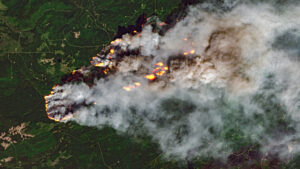This story was originally published by Grist. Sign up for Grist’s weekly newsletter here.
By Zoya Teirstein, Grist

It has been a chaotic start to the Northern Hemisphere’s “danger season,” those few months of the year that are accompanied by a parade of disasters. This year’s danger season already includes abnormally high sea-surface temperatures in the world’s oceans, catastrophic wildfires in Canada and unusual flooding in California.
Experts say recent extremes are being influenced by a hodgepodge of distinct factors. Climate change is involved, but natural variations in global weather, and an unfortunate dose of serendipity, are also at play.
“Global warming itself hasn’t suddenly accelerated this year,” Daniel Swain, a climate scientist at the University of California, Los Angeles, said in a live briefing on Monday. “Part of what’s going on is random bad luck.”
Last week, the U.S. National Atmospheric and Oceanic Administration announced that El Niño conditions — above average sea-surface temperatures that spur higher-than-usual warmth in many parts of the world — were officially present in the Pacific Ocean. The swing from La Niña, El Niño’s opposite extreme, to an El Niño means a much warmer year is in store for the entire globe. But the cycle, which is associated with extremes such as drought and severe storms, also has localized impacts. In eastern and southern Africa, the Horn of Africa, Latin America, the Caribbean, and parts of the Asia-Pacific region, El Niño can spur famine, outbreaks of infectious disease, and heat stress. The natural weather phenomenon may also be having an impact, Swain said, on record-breaking land surface temperatures in Canada that have helped to fuel its devastating fire season so far.
At the same time, scientists have been keeping tabs on a separate phenomenon unfolding in the Atlantic Ocean. Temperatures in the Atlantic hurricane region have been anomalously high for three months now. They are currently 82 degrees Fahrenheit on average — 35% higher than a prior record set in 2005.
“There has never been any day in observed history where the entire North Atlantic has been nearly as warm as it is right now,” Swain said. The rest of the Atlantic Basin — the Gulf of Mexico and the Eastern Seaboard — is also warmer than average, which means an active Atlantic hurricane season may be on tap. Generally, El Niño suppresses hurricane activity in the Atlantic and leads to a more severe typhoon season in the Pacific, but above-average Atlantic Ocean temperatures may negate El Niño’s dampening effects and fuel big Atlantic hurricanes this year.
A third factor, a volcanic eruption that occurred at the beginning of 2022 in the southern Pacific Ocean, is also contributing to above-average global temperatures. Volcanic eruptions typically have a temporary cooling effect on the planet because they shoot soot and other sun-blocking particles into the air. But the Hunga Tonga–Hunga Haʻapai eruption in the Tongan archipelago wasn’t a typical volcanic eruption. “This was a sub-oceanic, huge, massively explosive eruption that essentially vaporized huge quantities of sea water,” Swain said. The volcano’s plume was so intense that it shot vaporized water into the stratosphere, where the vapor has been having a warming effect on the planet.
All of this means we’re in for a period of accelerated warming due to the convergence of these factors. The good news is that the warming effect that El Niño and the Hunga Tonga eruption are having on the planet is temporary. El Niño lasts between nine and 12 months and the vaporized water in the stratosphere will fade in a few years.
The bad news is that climate change, which experts say contributed to the formation of this year’s El Niño and may be behind the record-breaking ocean temperatures in the North Atlantic, is still churning in the background. It isn’t going away anytime soon.
“The long-term trend is not going to stop,” Swain said. “We are stair-stepping up on our way to much warmer oceans and a much warmer climate.”
This article originally appeared in Grist at https://grist.org/climate/why-is-the-summer-off-to-such-an-extreme-start/.
Grist is a nonprofit, independent media organization dedicated to telling stories of climate solutions and a just future. Learn more at Grist.org



 (@DrTELS)
(@DrTELS) 
